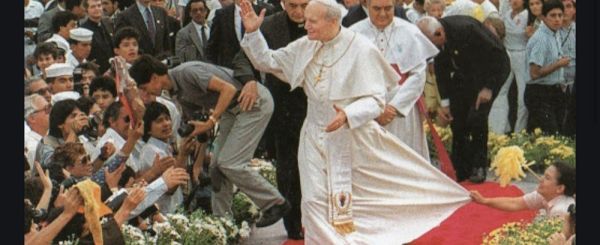1. The mission of Christ the Redeemer, which is entrusted to the Church, is still very far from completion. As the second millennium after Christ's coming draws to an end, an overall view of the human race shows that this mission is still only beginning and that we must commit ourselves wholeheartedly to its service. It is the Spirit who impels us to proclaim the great works of God: "For if I preach the Gospel, that gives me no ground for boasting. For necessity is laid upon me. Woe to me if I do not preach the Gospel!" (1 Cor 9: 16)
In the name of the whole Church, I sense an urgent duty to repeat this cry of St. Paul. From the beginning of my Pontificate I have chosen to travel to the ends of the earth in order to show this missionary concern. My direct contact with peoples who do not know Christ has convinced me even more of the urgency of missionary activity, a subject to which I am devoting the present encyclical.
The Second Vatican Council sought to renew the Church's life and activity in the light of the needs of the contemporary world. The Council emphasized the Church's "missionary nature," basing it in a dynamic way on the Trinitarian mission itself. The missionary thrust therefore belongs to the very nature of the Christian life, and is also the inspiration behind ecumenism: "that they may all be one...so that the world may believe that you have sent me" (Jn 17:21).
2. The Council has already borne much fruit in the realm of missionary activity. There has been an increase of local churches with their own bishops, clergy and workers in the apostolate. The presence of Christian communities is more evident in the life of nations, and communion between the churches has led to a lively exchange of spiritual benefits and gifts. The commitment of the laity to the work of evangelization is changing ecclesial life, while particular churches are more willing to meet with the members of other Christian churches and other religions, and to enter into dialogue and cooperation with them. Above all, there is a new awareness that missionary activity is a matter for all Christians, for all dioceses and parishes, Church institutions and associations.
Nevertheless, in this "new springtime" of Christianity there is an undeniable negative tendency, and the present document is meant to help overcome it. Missionary activity specifically directed "to the nations" (ad gentes) appears to be waning, and this tendency is certainly not in line with the directives of the Council and of subsequent statements of the Magisterium. Difficulties both internal and external have weakened the Church's missionary thrust toward non-Christians, a fact which must arouse concern among all who believe in Christ. For in the Church's history, missionary drive has always been a sign of vitality, just as its lessening is a sign of a crisis of faith.
Twenty-five years after the conclusion of the Council and the publication of the Decree on Missionary Activity Ad Gentes, fifteen years after the Apostolic Exhortation Evangelii Nuntiandi issued by Pope Paul VI, and in continuity with the magisterial teaching of my predecessors, I wish to invite the Church to renew her missionary commitment. The present document has as its goal an interior renewal of faith and Christian life. For missionary activity renews the Church, revitalizes faith and Christian identity, and offers fresh enthusiasm and new incentive. Faith is strengthened when it is given to others! It is in commitment to the Church's universal mission that the new evangelization of Christian peoples will find inspiration and support.
But what moves me even more strongly to proclaim the urgency of missionary evangelization is the fact that it is the primary service which the Church can render to every individual and to all humanity in the modern world, a world which has experienced marvelous achievements but which seems to have lost its sense of ultimate realities and of existence itself. "Christ the Redeemer," I wrote in my first encyclical, "fully reveals man to himself.... The person who wishes to understand himself thoroughly...must...draw near to Christ.... [The] Redemption that took place through the cross has definitively restored to man his dignity and given back meaning to his life in the world."
[Pope John Paul II, Redemptoris Missio]












